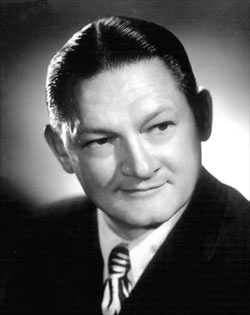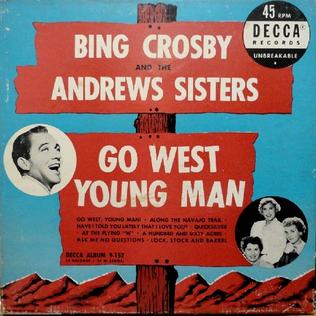
Harry Lillis "Bing" Crosby Jr. was an American actor, singer, television producer, television and radio personality, and businessman. The first multimedia star, he was one of the most popular and influential musical artists of the 20th century worldwide. Crosby was a leader in record sales, network radio ratings, and motion picture grosses from 1926 to 1977. He was one of the first global cultural icons. Crosby made over 70 feature films and recorded more than 1,600 songs.
Quicksilver may refer to:

Albert Victor Young was an American composer, arranger, violinist and conductor. Young was posthumously awarded the Academy Award for Best Music Score of a Dramatic or Comedy Picture for Around the World in 80 Days at the 29th Academy Awards in 1957.
Dream House or dreamhouse may refer to:

"The Teddy Bears' Picnic" is a song consisting of a melody written in 1907 by American composer John Walter Bratton, and lyrics added in 1932 by Irish songwriter Jimmy Kennedy. It remains popular in Ireland and the United Kingdom as a children's song, having been recorded by numerous artists over the decades. Kennedy lived at Staplegrove Elm and is buried in Staplegrove Church, in Taunton, Somerset, England. Local folklore has it that the small wooded area between the church and Staplegrove Scout Hut was the inspiration for his lyrics.

Gary Evan Crosby was an American actor and singer. His parents were Bing Crosby, of whom he wrote a highly critical memoir, and the singer and actress Dixie Lee.
"Some Enchanted Evening" is a show tune from the 1949 Rodgers and Hammerstein musical South Pacific. It has been described as "the single biggest popular hit to come out of any Rodgers and Hammerstein show." Andrew Lloyd Webber describes it as the "greatest song ever written for a musical".
"Anything You Can Do (I Can Do Better)" is a show tune composed by Irving Berlin for the 1946 Broadway musical Annie Get Your Gun. The song is a duet, with one male singer and one female singer attempting to outdo each other in increasingly complex tasks.
Strangers are people who are unknown to another person or group.
Mind the gap is a common safety announcement on the London Underground railway system and other train and subway systems, warning of the visual gap between the train doorway and the station platform.
Anything Goes is a musical by Cole Porter.
A Connecticut Yankee in King Arthur's Court is a 1949 American comedy musical film directed by Tay Garnett and starring Bing Crosby, Rhonda Fleming, Sir Cedric Hardwicke and William Bendix.

Anything Goes is a 1956 American musical film directed by Robert Lewis, and starring Bing Crosby, Donald O'Connor, Zizi Jeanmaire, and Mitzi Gaynor. Adapted from the 1934 stage musical Anything Goes by Cole Porter, Guy Bolton, and P. G. Wodehouse, the film is about two entertainers scheduled to appear in a Broadway show who travel to Europe, where each discovers the perfect leading lady for the female role. Bing Crosby's character, Bill Benson, goes to England and meets Mitzi Gaynor's character Patsy Blair, and he signs her as the female lead. Meanwhile, Donald O'Connor's character, Ted Adams, travels to France and meets Jeanmaire's character, Gaby Duval, and he signs her to the same role. On the return voyage, with each man having brought his leading lady along, the Atlantic becomes a stormy crossing when each man must tell his discovery that she might not get the role.

This is a filmography for the American singer and actor Bing Crosby.
Gone Fishing or Gone Fishin' may refer to:

Go West Young Man is a compilation album of songs on one 10" vinyl record by Bing Crosby and The Andrews Sisters released in 1950 featuring songs that were sung by Crosby and the Sisters with a Western-type genre. This album is one of the first by Crosby to not be released on 78 rpm records before going straight to an LP or set of 45s. The album includes several songs which had already enjoyed Billboard chart success. “Along the Navajo Trail” reached the No. 2 position in 1945 and "One Hundred and Sixty Acres", "Have I Told You Lately That I Love You?" and "Quicksilver" also charted.
The Welcome Stranger is the largest alluvial gold nugget ever found.
This page is based on this
Wikipedia article Text is available under the
CC BY-SA 4.0 license; additional terms may apply.
Images, videos and audio are available under their respective licenses.






